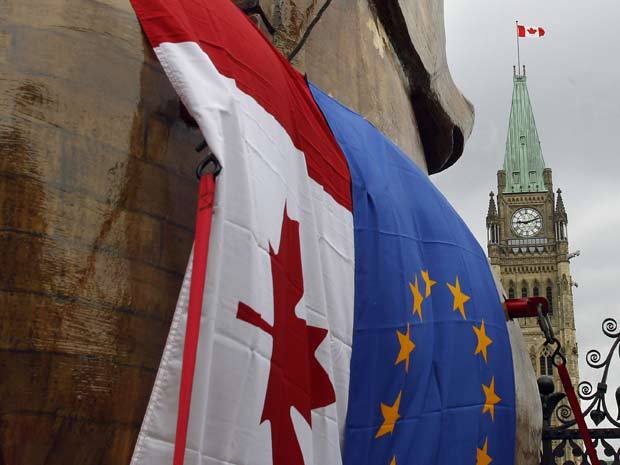The ongoing negotiations on the Comprehensive Economic and Trade Agreement (CETA) between Canada and the European Union have received renewed attention after President Obama’s most recent State of the Union address. Mr. Obama affirmed the United States’ interest in establishing a Trans-Atlantic Trade and Investment Partnership and since his statement the spotlight has turned, even more brightly, to CETA as a precursor.
Since negotiations started in 2009, there has been “considerable progress” according to Prime Minister Harper and French Prime Minister Jean-Marc Ayrault during the latter’s visit to Ottawa last March. The agreement encompasses a multitude of sectors from trade of goods and services, tariffs and mobility, to customs procedures.
[captionpix align=”left” theme=”elegant” width=”300″ imgsrc=”http://natoassociation.ca/wp-content/uploads/2013/05/cheval-de-troie-5.jpg” captiontext=”Several civilian groups, as well as Municipalities, are wary of the possible effects of CETA, with some even comparing it to the archetypal Trojan horse. “]
The scope of the partnership has, inevitably, led to some frictions. The main points of contention are currently the opening up of European agricultural markets and Canadian regulations on intellectual property, particularly in pharmaceuticals. On these issues, Mr. Harper maintains that his government will only sign an agreement when convinced that the deal “is comprehensive and in the best interests of the Canadian economy” while the European Union’s Trade Commissioner Karel de Gucht remarks that Canada has to change its positions for a deal to be struck.
Furthermore, the matter of opening government procurement to the European market has met with internal resistance, mostly from unions and municipalities, which have asked to be exempt from CETA, including the City of Toronto.
Despite the disagreements on these issues, there are substantial national advantages to settling CETA, and in doing so promptly:
- CETA will allow various Canadian economic sectors to substantially expand their consumer base by granting easy access to one of the world’s largest markets. It will also cause smaller exporters to cut transaction and transportation costs, which will mean higher efficiency and will trigger growth.
- Closing the deal before the United States embarks on a similar partnership offers Canadian industries a foothold in the European market; an opportunity to establish its exports and trade relations before it has to compete with the bigger American economy.
- Access and influence in the European markets will give the Canadian economy more weight and strength when establishing and developing relations with emerging markets.
- The Canadian economy has an increasing need for continued diversification. In 2012, sales to the United States accounted for 72.3% of Canadian exports of goods and a marginally lower 69.5% of total exports of goods and services. The United States is a valuable neighbour and trading partner, and the relationship should continue to strengthen, but less dependence is advisable if not necessary for Canadian economic stability.
Finally, CETA makes sense given Canada’s affiliations on the world stage:
- As a member of NATO, and according to Article 2 of the North Atlantic Treaty, it is committed to “encourage economic collaboration between any or all of them [The parties of the treaty]”. Given that 21 out of the 27 EU countries are also NATO members, Article 2 becomes highly relevant. In addition, NATO Secretary General Anders Fogh Rasmussen has publicly endorsed a Trans-Atlantic deal and, in his latest press conference, stressed the need for deeper NATO-EU political and economic cooperation.
- Canada cannot ignore its membership in the World Trade Organization, whose primary purpose is, as noted on their website, to “open trade for the benefit of all.”
Overall, CETA will open the doors to economic growth with minimal fiscal spending, and will establish Canada as a more desirable and stable market. Moreover, reaching an agreement will demonstrate Canada’s continued commitment to NATO and WTO values, both of which stress the importance of forging closer trade relations between their respective member states.




